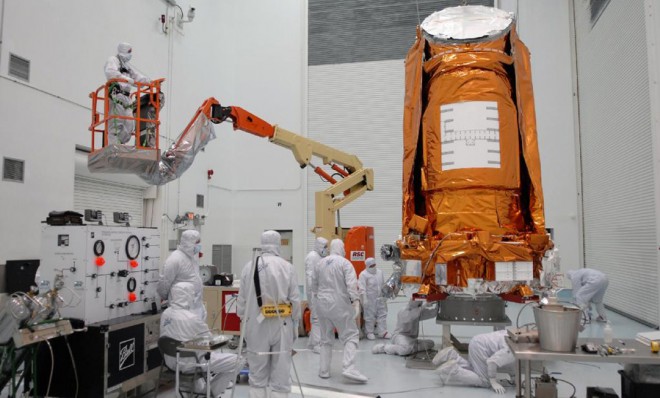Can Kepler's hunt for another Earth be salvaged?
A glitch disables the spacecraft's super-powered telescope after four years searching the heavens for planets in the Goldilocks zone


A free daily email with the biggest news stories of the day – and the best features from TheWeek.com
You are now subscribed
Your newsletter sign-up was successful
The mission of NASA's Kepler spacecraft is in peril.
The space agency says a malfunction has disabled a reaction wheel that keeps Kepler's telescope pointed precisely at far-away planets, a glitch that could, conceivably, put an end to Kepler's search for possibly habitable, Earth-like planets orbiting far-away stars. Losing Kepler would be a tremendous setback.
Kepler, launched in 2009, has identified 130 planets and 2,740 other possible planets, many of which are probably rocky worlds similar to Earth. Just last month, astronomers reported that the telescope — which detects slight dips in starlight to spot planets orbiting about 100,000 target stars in the constellations Cygnus and Lyra — had found two more planets, only slightly larger than Earth, orbiting a star 1,200 light-years away in a star's Goldilocks zone, where liquid water is possible.
The Week
Escape your echo chamber. Get the facts behind the news, plus analysis from multiple perspectives.

Sign up for The Week's Free Newsletters
From our morning news briefing to a weekly Good News Newsletter, get the best of The Week delivered directly to your inbox.
From our morning news briefing to a weekly Good News Newsletter, get the best of The Week delivered directly to your inbox.
Mission team members aren't going to give up on Kepler without a fight. "We'll try the same things you'd do to unstuck a wheel on Earth," Charles Sobeck, Kepler's deputy project manager, tells TIME. "We'll try jiggling it, commanding it to move back and forth in both directions, forcing it through whatever might be holding it back." Engineers will also try resurrecting another reaction wheel that failed last year. Kepler has four, and it needs at least three to keep its telescope locked on target.
What are the odds one of the tricks will work? Nobody knows for sure. And the effort to get the wheel that failed last year going again could take months. But some Kepler fans are bracing for the worst. "Although it's a little early to be writing Kepler's obituary, the signs are not good," says Stuart Clark at Britain's Guardian. During the repair effort, the mission team will keep Kepler parked in a way that conserves its fuel. "This gives mission planners time to ponder their options," Clark says. "They can either halt the mission or continue collecting lower quality data" if the telescope proves unsalvageable.
Regardless of what happens next, however, space scientists say that Kepler's $600 million mission can already be chalked up as a huge success.
Kepler has sent back so much data that scientists will be analyzing its findings for years. "Frankly, I'm absolutely delighted that we've got all this data... that we have found so many thousands of planetary candidates," Kepler lead scientist William Borucki tells Discovery News. "The mission was designed for four years, it operated four years. It gave us excellent data for four years. So I'm very delighted." Borucki conceded that getting the telescope working again would help identify more planets in the habitable zone. "That would have been in some sense frosting on the cake," he said. "But we have an excellent cake right now."
A free daily email with the biggest news stories of the day – and the best features from TheWeek.com
And remember, Kepler isn't alone out there. In October, the European Space Agency announced that it would build its own space telescope, which it hopes to launch in 2017. It will target bright stars relatively nearby looking for possible homes to extraterrestrial life. And NASA has its own mission slated to go up the same year — the Transiting Exoplanet Survey Satellite (Tess), which will survey 2 million nearby stars. "Even if this is the end for Kepler," says the Guardian's Stuart Clark, "the search for another Earth does not die with it."
Harold Maass is a contributing editor at The Week. He has been writing for The Week since the 2001 debut of the U.S. print edition and served as editor of TheWeek.com when it launched in 2008. Harold started his career as a newspaper reporter in South Florida and Haiti. He has previously worked for a variety of news outlets, including The Miami Herald, ABC News and Fox News, and for several years wrote a daily roundup of financial news for The Week and Yahoo Finance.
-
 5 cinematic cartoons about Bezos betting big on 'Melania'
5 cinematic cartoons about Bezos betting big on 'Melania'Cartoons Artists take on a girlboss, a fetching newspaper, and more
-
 The fall of the generals: China’s military purge
The fall of the generals: China’s military purgeIn the Spotlight Xi Jinping’s extraordinary removal of senior general proves that no-one is safe from anti-corruption drive that has investigated millions
-
 Why the Gorton and Denton by-election is a ‘Frankenstein’s monster’
Why the Gorton and Denton by-election is a ‘Frankenstein’s monster’Talking Point Reform and the Greens have the Labour seat in their sights, but the constituency’s complex demographics make messaging tricky
